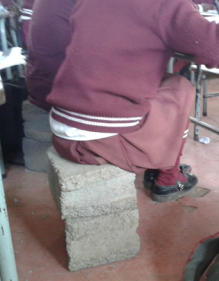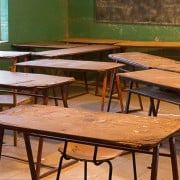|
Getting your Trinity Audio player ready...
|
 EE DEMANDS MINISTER MOTSHEKGA RELEASE PROVINCIAL IMPLEMENTATION PLANS FOR NORMS AND STANDARDS FOR SCHOOL INFRASTRUCTURE!
EE DEMANDS MINISTER MOTSHEKGA RELEASE PROVINCIAL IMPLEMENTATION PLANS FOR NORMS AND STANDARDS FOR SCHOOL INFRASTRUCTURE!
Yesterday and today (1 and 2 April), more than 600 Equal Education (EE) student members – equalisers – have been holding sleep-in protests outside the Department of Basic Education (DBE)in Pretoria, Parliament in Cape Town, and the Eastern Cape Department of Education in Zwelitsha, King William’s Town. EE is demanding that Basic Education Minister Angie Motshekga release provincial implementation plans for norms and standards for school infrastructure.
The DBE must stop hiding the provincial implementation plans and release them immediately. These plans were handed to the minister in November last year by the nine provincial MECs for education. Many of the 600 equalisers are elected members of EE’s leadership committees, meaning they represent thousands of students in schools across South Africa.
Without implementation plans schools will continue to lack water, electricity, toilets, adequate classrooms, fencing, libraries, laboratories and other essentials. Although some progress has been made, the DBE’s latest report shows thousands of schools lacking the most essential facilities.
Mr James Komape, the father of Michael Komape, the six-year old Grade R learner from Chebeng Village, Limpopo, who died tragically a year ago after falling into a pit latrine toilet at his school, joined EE members in Pretoria on 1 April. Mr Komape has recently stated: “It is important the plans be released urgently because many children are suffering. Libraries are a long way away, desks are old and broken. The minister’s not releasing the plans means the standard of safety and infrastructure in schools is as it was when my son died.”
On 28 November 2014, the Department of Basic Education released a statement saying it would make the plans public after the minister had considered them. The minister has now had 120 days to consider the plans, and still they have not been made public. DBE spokesperson Elijah Mhlanga said recently: “The plans will be published in the next few weeks. The processes needed to be followed first”.
We find this unacceptable because we are nearly halfway through the first binding three-year timeframe contained in the norms and standards. According to this timeframe, by the end of November 2016, all schools with no water, electricity and sanitation will have to be provided with these services, and all schools made entirely out of mud, wood, and asbestos will need to be rebuilt.
EE wrote to the minister on 9 December 2014, formally requesting the plans and asking that they be made public. EE also wrote to all nine provincial education MECs requesting that they release their plans. EE wrote again to the minister on 27 February 2015 and 12 March 2015, and on 19 March 2015 the Equal Education Law Centre (EELC) submitted an access-to-information (PAIA) request for the plans.
There are four reasons why we are demanding these plans:
1. The new norms and standards regulations require the plans.
2. Without making the plans public there is no way to assess whether provincial departments have planned and budgeted adequately. The minister of finance, Nhlanhla Nene, said in his budget speech that the November 2016 timeframe in the norms and standards would be met. But nobody can accept this without seeing that there are plans, which have been budgeted for. Instead there are worrying signs: School infrastructure is funded through two grant allocations – the education infrastructure grant) and the accelerated school infrastructure development initiative. The combined value of both of these grants has been reduced by R1.4-billion for the 2015/2016 financial year.
3. Without the plans being made public, students, teachers and parents will not know whether their schools have been included on the lists or not. We already have serious concerns about the lists on which provincial education departments are basing their plans. In our November 2014 statement we said: “According to the information [EE] received under PAIA, in the Eastern Cape there are 260 schools without electricity, 90 without water and 66 without sanitation. According to the latest NEIMS Report, in the Eastern Cape there are 377 schools without electricity, 399 without water and 366 without sanitation. Without accurate information, provincial education department will not be able to plan properly, and many schools run the risk of not being identified for the provision of water, electricity and sanitation.”
4. In an accountable government, the plans must be publicly available. This makes it possible for learners, parents, teachers and communities to mobilise to ensure delivery.
As Equal Education we are committed to ensuring the norms and standards are implemented. We campaigned for the adoption of this progressive piece of legislation for over three years and will continue to work to ensure that its potential is realised, and that all students are taught in safe, dignified and proper schools.
Memorandums will be handed over in all three provinces. Equalisers will be engaging in different activities over the two days. Check the EE website for details.
For more information contact:
Nombulelo Nyathela, EE Spokesperson – 060 503 4933
Brad Brockman, EE General Secretary – 072 267 8489
Tshepo Motsepe, Co-head of Gauteng office – 071 886 5637
Nishal Robb, Head of Western Cape office – 079 511 6790
Lumkile Zani, Head of Eastern Cape office – 071 903 4497







